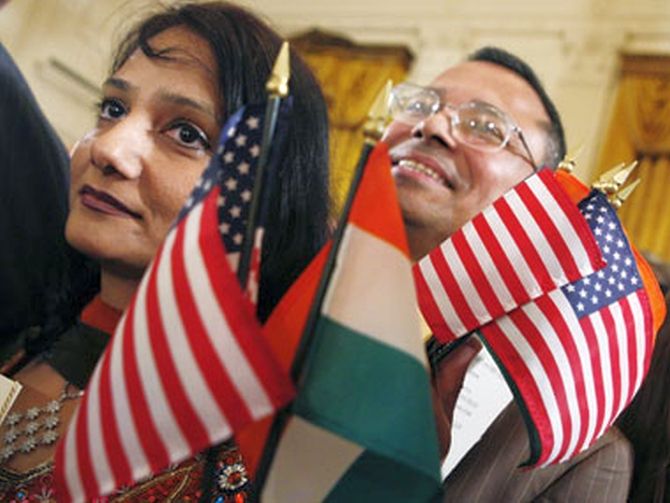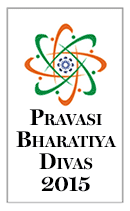
It is critical to engage politicians in the US and India to recognise the achievements of the three-million-strong Indian-American community, says M R Rangaswami, founder of Indiaspora.
As India gears up to honour its pravasis on January 9 to mark their contribution in the nation’s development, Rediff.com presents perspectives from eminent writers on the Diaspora.
Earlier in this series:
A salute to India
A look back in anxiety
The coup that changed India's Diaspora policy
Friends of India
The India I want to see
'India has stayed in my blood'
Bharat Mata and her children
Build and they will come
The power of India extends far beyond its borders. When you look at how India has changed -- and will evolve in the future -- it is important to factor in the potential for the Indian Diaspora to have big impact on the homeland.
On the 100th anniversary of Gandhiji’s return to India, we pause to remember the impact he had during his stays in South Africa and England.
We, the 30 million members of the Indian Diaspora, can follow in his footsteps: Pushing for positive change in our new countries and in India.
In 2012, Indiaspora was founded to transform the individual success of Indian Americans into meaningful collective impact in India and on the global stage.
Our organisation aims to unite the professionally, geographically, and religiously diverse community of Indian Americans -- a group that accounts for only 1 percent of the US population, yet is one of the country’s most successful and affluent ethnic groups.
In the process of bringing Indiaspora to life, we learned much about the power of Indians abroad and the best ways to rally them for action.
Here are three overarching best practices for engaging the Diaspora:
1. Connect Your Community
Indians in America have made their marks in a wide variety of fields, including academia, arts, business, entertainment, healthcare, media, philanthropy, politics, science and technology.
Indiaspora’s challenge was to find these leaders and connect them in a way that respects their already busy lives.
We began by reaching out to target members the ‘old-fashioned’ ways: Telephone and e-mail.
In September 2012, Indiaspora held its inaugural forum in New York’s picturesque Hudson River Valley. One hundred founding members engaged in a mix of strategic discussion and candid conversation over the course of the intimate three-day forum.
Indiaspora’s forum successfully established a new epicentre for the diverse array of Indian-American perspectives.
Since the initial gathering, Indiaspora has continued to grow its membership and spread its influence with the use of social media, including the Indiaspora Blog, Twitter feed and Facebook page.
2. Raise Your Profile
One of the primary missions of the inaugural Indiaspora forum was to provide the community a voice with which it could articulate collective goals. One of the most important goals voiced by a majority of members involved raising the profile of the Indian-American community.
Although powerful individually, Indians are relatively recent additions to the US ‘melting pot’ and lack mainstream recognition and political representation compared to other ethnic groups in America.
 Indiaspora has taken significant steps to raise the Diaspora’s profile in the US.
Indiaspora has taken significant steps to raise the Diaspora’s profile in the US. In January 2013, we hosted a ball in Washington, DC, to celebrate President Obama’s inauguration. A sold-out crowd of 1,200 Indian Americans, compatriots from India and well-wishers rubbed elbows with political leaders and celebrities.
When qualified Indian Americans are considered for national posts, we campaign to support their nominations.
Recently, Indian Americans were appointed Ambassador to India and Surgeon General. We feel it is critical to engage politicians in the US and India in order to recognise the achievements of the three million strong Indian-American community.
3. Remembering the Homeland
Indiaspora members unanimously agree that it is critical to advance both local and Indian causes. But the Diaspora holds a unique position to serve as an ambassador of Indian culture and causes in their adopted home countries.
In the US, most Americans are unfamiliar with Indian culture and customs.
The current exhibit at the Smithsonian, Beyond Bollywood, works to fill the knowledge gap.
We should promote the celebration of our Indian holidays.
Indiaspora is advocating the creation of a US postage stamp to commemorate Diwali as the UK, Canada and many other countries have done. A stamp would serve as symbolic acceptance of an Indian holiday celebrated by more than one billion people worldwide.
Finally, and most importantly, we must work to refine the philanthropic model that enables Indian Americans to support worthwhile causes back home.
It is part of Indiaspora’s mission to connect with charitable giving opportunities by finding, donating and mentoring worthy organisations.
I believe India’s future is bright. Like many other members of the Diaspora, I look forward to engaging more of the worldwide Diaspora on collaborations that improve the lives of Indians -- and Indians abroad.
M R Rangaswami is the founder of Indiaspora.











 © 2025
© 2025